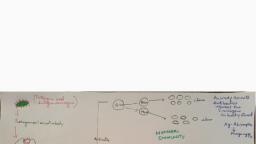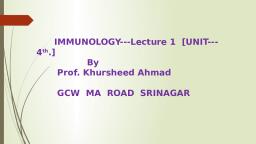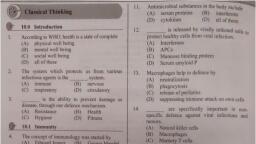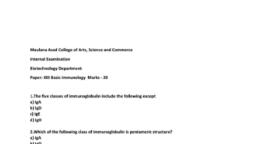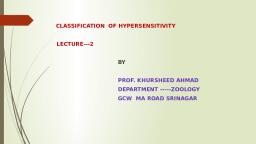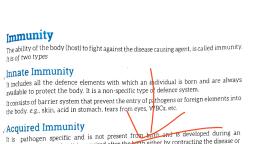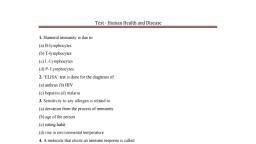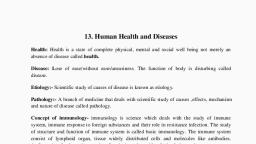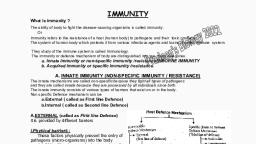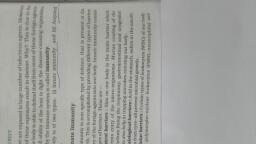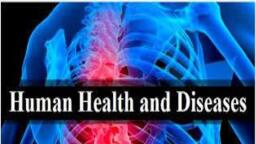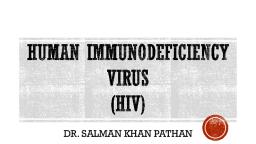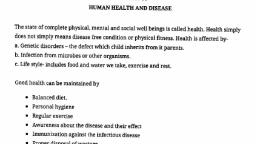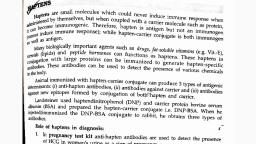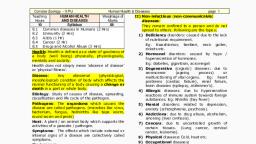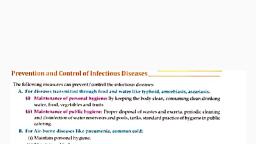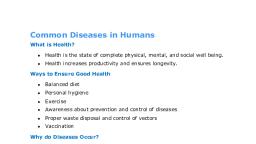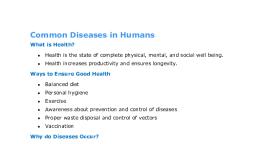Page 1 :
IMMUNOLOGY---Lecture 1 [UNIT---4th.]� By� Prof. Khursheed Ahmad�� GCW MA ROAD SRINAGAR
Page 2 :
HYPERSENSITIVITY, The term immunity refers to the ability of the host body to, , resist the diseases / injury caused by, , micro organisms or their products. OR, , Branch of microbiology that meets the challenge &, , offers an opportunity to fight & check the spread of, , several diseases is called as immunity.
Page 3 :
Immune system, IMMUNITY Pry. Lymp. organs, , Ability of host body to resist B.Marrow & Thymus , diseases caused by Formation &, micro-organisms or maturation of lympho- , their products. , OR Sec. Lymp. Organs, Offers an opportunity to fight & Maintain mature, check the spread of diseases. Lymphocytes &, Initiate adaptive--
Page 4 :
Actually when a healthy body gets an exposure to an antigen ,, it produces an immune response which may be appropriate or , inappropriate., , In case of former it is protective—destroying the antigen / its products, only without any damage to the host tissue—it refers to immunity., , In case of latter , it results in the damage of host tissues , it refers to, hypersensitivity., Thus an inappropriate response by the body after being exposed to, antigens is called as Hypersensitivity.
Page 5 :
HYPERSENSITIVITY, Normal Healthy individual , , , Regain of Exposure to antigen (Exogenous / Endogenous), body Homeostasis, , Generation of immune response (phagocytosis,, Ab-synthesis , Inflammation), Protective Immune-- Inappropriate/increased/Deleterious-- , Response. Response., (Immunity) (hypersensitivity)
Page 6 :
Normally an immune response mobilizes a collection of, , effector molecules that act to remove / eliminate, , antigen by inducing a localized inflammatory response , , without damaging the host tissues., , [Mobilize--- Organizing & preparing troops for active service]
Page 7 :
However under certain circumstances , the inflammatory response is , , inappropriate-----beyond the expectation or is heightened / increased , , resulting in significant tissue damage or even death., , This inappropriate immune response is called as hypersensitivity or , , sometimes allergy.
Page 8 :
The ability of immune system to respond inappropriately ,, , was first recognized by two French scientists Paul Portier & , , Charles Richet when they investigated the , , problem of bathers in the Mediterranean sea reacting violently to the , , stings of Physalia (Portuguese Man of war) & reached to the , , conclusion that this problem of bathers was due to toxins.
Page 9 :
According to C. Richet, their toxin contained 02 important , , components----thalassin & congestin., , The former induced immunity where as the latter being poisonous , , promoted damaging of host tissues due to an overreaction / , Hypersensitivity.
Page 10 :
PORTIER & RICHET collected a good sample of Physailia at the seashore., , They ground some specimens along with the sand , mixed with sea water &, then filtered the mixture , the filtrate was injected into pigeons & G. pigs which, suffered from anesthesia., , Next they decided to investigate whether an immunity may be developed, by injecting repeated doses of the toxin at longer intervals , so continued their , work in Paris rather than at sea beaches.
Page 11 :
Here they started their work on dogs by injecting a weak toxin derived from, , Actinia & found that rather than being immune they became sensitized to, , the toxin with repeated doses & the toxic symptoms increased. , , For example,
Page 12 :
A dog—Neptune was given 03 doses within 22 days., , The 1st. dose produced no effect. , , The 2nd. weak dose was given after 03 days & no effect was observed except , , mild symptoms but , , the 3rd. weak dose was given after 3 weeks & the dog reacted immediately with, , vomiting , diarrhea , asphyxia & even death.
Page 13 :
They called it as an over reaction by the body to the antigen & coined , , the term anaphylaxis., , At that time immunity was regarded sacred , being protective & its , , negative effect was unimaginable., , For this work C. Richet was awarded noble prize in 1913.
Page 14 :
Later the fact that immune response was indeed involved in , , hypersensitivity reactions was also supported by an Austrian , pediatrician Clemon Von Pirquet who coined the term allergy--- a, , disorder of immune system in which body reactions occur to normally harmless environmental substances called as allergens., , In 1906 he observed that some of his patients overreacted to , innocuous things like dust , pollen& some foods.
Page 15 :
He coined term allergy from Greek words ---allos ---- other / different &, , ergos---work or reaction in order to differentiate these responses , , from the normal immune responses.
Page 16 :
Thus the term Hypersensitivity can be defined as , , , the induction of a state of excessive / increased immune response , , , responsible for causing damage to the natural tissues of the host body , , when exposed to an apparently innocuous antigen.
Page 17 :
In simpler words ,, , if a person is more sensitive to an antigen as compared to normal , , response shown by other person to the same antigen ,, , then an elevated or increased immune response results in , , HYPERSENSITIVITY,
Page 18 :
Under these conditions , the individual is more sensitive to an antigen , , exposure instead of being protective., , Antigenic substance responsible for hypersensitivity is called as , , allergen.
Page 19 :
Further the individuals that are exposed to normal antigen are , , said to be immunized where as the individuals which are, , exposed to allergens are said to be sensitized.
Page 20 :
Features of Hypersensitivity, , 1. Are antigen specific., , 2. Occur after the immune system has already been primed or exposed to, , an antigen i.e., individuals has been sensitized.
Page 21 :
3. Hypersensitivity is not manifested on the first contact with antigen, , but usually occurs on subsequent contacts.
Page 22 :
Anaphylaxis:, , Severe life threatening allergic reaction occurring within , , seconds or minutes of exposure to an allergen., , Symptoms / Manifestation:, , 1. Skin rash , Nausea , Vomiting , itching , Flushed or pale skin.
Page 23 :
Low BP—hypotension, , Constriction of airways & swollen tongue or , , throat causing wheezing and trouble in , , breathing.
Page 25 :
4. Feeling lightheaded / faint., , 5. Confusions , anxiety & fast heart rate., , Most common---01 million cases per year.
Page 26 :
THANK YOU VERY MUCH� � STAY BLESSED





















